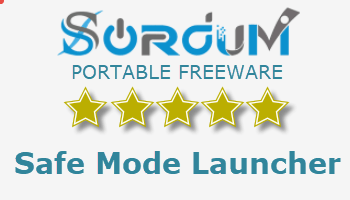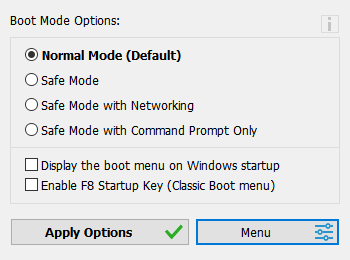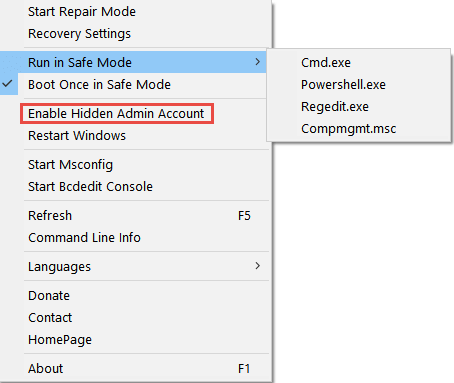Since Microsoft decided to render the “F8” method of accessing Safe Mode practically useless, accessing Safe Mode in Windows 10/11 has become a bit of a rigmarole and perhaps a tad convoluted for less experienced users. Here then is a little portable freeware utility that allows users to easily access Safe Mode.
Introducing Safe Mode Launcher
Safe Mode Launcher is a portable freeware application that provides a Windows GUI (Graphical User Interface) to easily access Safe Mode options. The download consists of a 981KB ZIP folder extracting to 1.70MB. To run the software, simply double-click the extracted executable — either SafeMode.exe (for 32-bit systems) or SafeMode_x64.exe (for 64-bit systems).
- Download direct from the developer: Safe Mode Launcher
NOTE: Because the software is not well-known, Windows might pop up a warning — click More info and then Run anyway. The software is perfectly safe and scans 100% clean through Virus Total.
From there, it’s very straightforward, enable your preferred Safe Mode option and then click the Apply Options button. NOTE: When you enter Safe Mode using this software, a simple restart will automatically boot the system back into normal mode.
Clicking the Menu button provides several useful options, including enabling the hidden administrator account:
The developer of Safe Mode Launcher (Sordum) is a prolific freeware author, all titles are portable, lightweight, and safe. Make sure to check out Sordum’s extensive list of portable freeware: Sordum Home
- You also might like: 4 Ways To Access Advanced Startup (including directions on how to create a desktop shortcut)
BOTTOM LINE:
Frankly, accessing Safe Mode in Windows 10/11 is a pain in the butt. Safe Mode Launcher provides a very simple free and portable alternative.
—



Hi Jim,
Thanks for the tip !
I’m using this one for now (compatible Win 11 and also “portable”) :
https://www.d7xtech.com/free-software/bootsafe/
https://www.virustotal.com/gui/file/1456bf80e092253db540837c2bcb822268548b56d460df8998c349001fa1a312/detection/f-1456bf80e092253db540837c2bcb822268548b56d460df8998c349001fa1a312-1644058290
Hey Belga,
The two appear to be very similar. BootSafe looks like another good option. Thanks.
I’ve been using BootSafe for quite a while & I love it. It also gives you the option to restart in Normal Mode after you have restarted in Safe Mode, unlike Safe Mode Launcher which automatically boots into Normal Mode after a Safe Mode restart. Haven’t tried Safe Mode Launcher yet but planning to. Now I’m reading on the Safe Mode Launcher website that Win 10 & 11 machines with MS acct logins may not be able to be booted into Safe Mode! WTH? This is the first I’m hearing about this & I’m definitely giving it a shot.
Hey Warren,
The English in that bit (in the description on the website) is not very good. What it’s saying is that Win 10 and 11 users with a Microsoft Account might have to enter their password in order to login to Safe Mode. That’s perfectly normal and once the user enters their account password (or PIN) Safe Mode loads fine.
Personally, I prefer the automatic boot into normal mode following a restart because it ensures that the system doesn’t get stuck in a Safe Mode boot loop.
Jim, I recently read an article on the above topic. The article had many convoluted ways to do this, but at the end of the article it stated I could simply execute a command to get there.
Shutdown.exe /r /o
Now, I have not had the opportunity or need to try it since reading the article. But, if this works, it seems to be the simplest way.
Hey Tom,
That command does not boot directly into Safe Mode. It will boot to the recovery environment from where you’ll then need to click the usual buttons to get to the Safe Mode options.
Yes, you are right. I had an opportunity to give it a try.
There are “bcdedit” commands that will boot directly into Safe Mode but this creates a Safe Boot loop which will then need to be reversed, either by executing another “bcdedit” command or via System Configuration > Normal Startup.
The method as outlined in the above article is not only simpler but also safer. 🙂